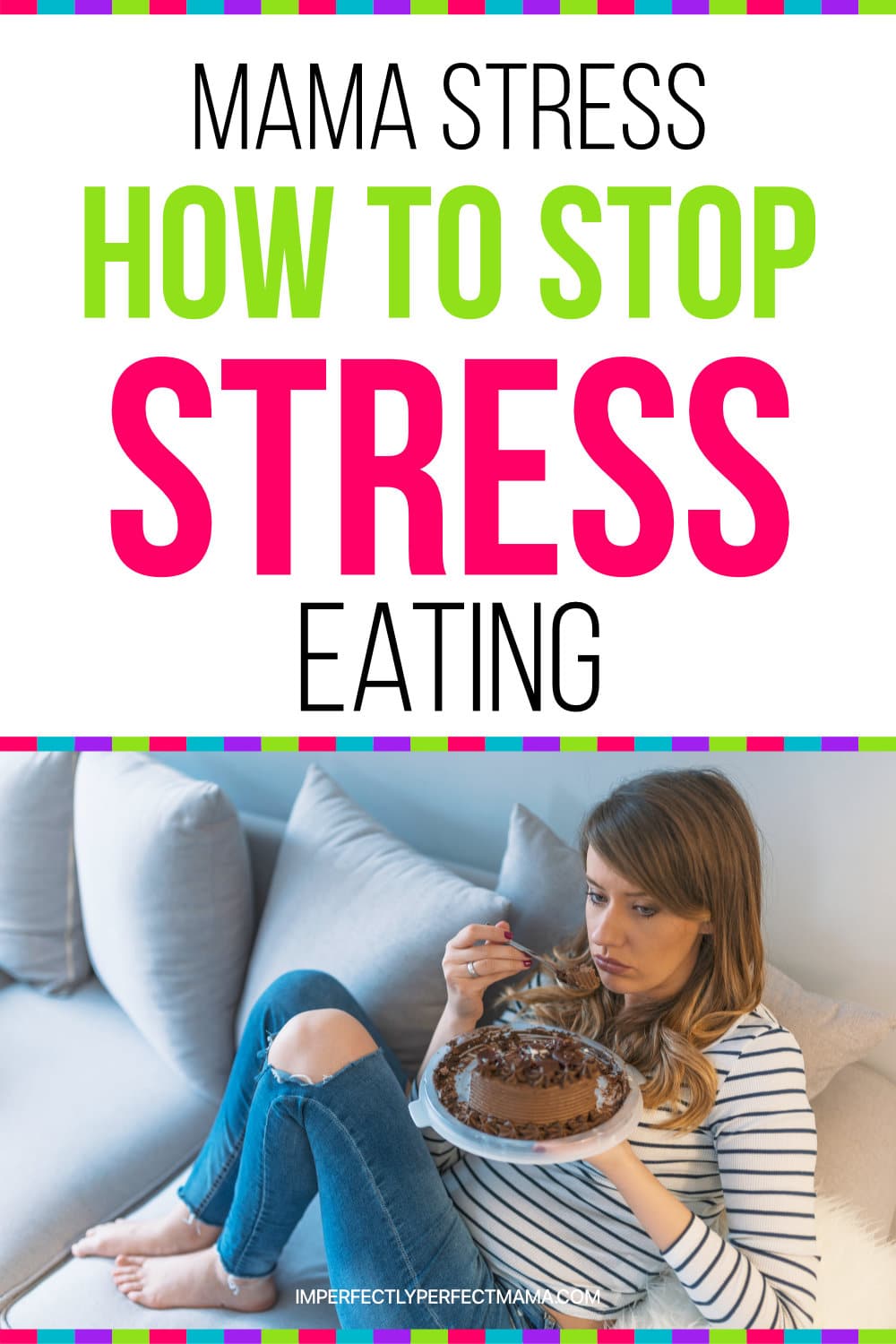After a whirlwind morning finally managing to get the kids down for a nap, or on your way home from work after a long day that’s not even close to being over, you feel the stress eating rising and suddenly crave something salty or sweet and full of comfort.

As moms, food may be the way you deal with stress because the alternative is blowing your top and yelling at your kids.
You think it’s better to silently gobble down chocolate chip cookies while hiding in the pantry than lose your temper in front of your littles is your stress eating habit.
As a mom, there is so much pressure on you to be the example and not ever show anger, sadness, or stress.
This is why we often stress eat in secret.
We never discuss it, seek help, or even openly acknowledge it with ourselves.
However, just as we feel guilty for losing our cool, instances of stress eating are followed by guilt, leaving us feeling worse than we did before the cookies called our name.
In this post I will help you learn how to stop stress eating for good!
Why Do We Stress Eat?
Responding to stress with food is not uncommon, but that doesn’t make it easy to stop.
Why do so many of us struggle with this pattern? What makes us reach for the ice cream practically on autopilot?
The first thing to know if you struggle with stress eating is there are much bigger factors at play than just willpower.
Stress triggers the hormone cortisol and cortisol causes you to want to eat calorie-dense foods (aka comfort foods) such as chips or ice cream.
If you tend to stress eat sugary foods, consuming high sugar foods causes your brain to release dopamine, a feel-good chemical.
Our brain and body note this response and then want it again and again.
It needs more and more sugar to reach the same temporary feel-good state, causing you to consume more and more.
In this way, food serves as a distraction.
It offers a moment’s respite and boosts our mood and our brain tells us we need this ultimate form of comfort.
You feel as if you’re wrapped in a warm, sugary hug.
However, the huge problem is that stress eating does not actually take away any stress, it simply gives your brain something else to focus on for a few minutes while avoiding those unpleasant feelings.
As soon as you stop eating, the stress returns.
The habit of stress eating is just that, a habit.
It turns into a cycle that can be very difficult to break because your brain is literally telling you to eat when stressed.
It’s like the little devil on your shoulder whispering in your ear.
But you can break the habit and find ways to cope with stress without the comfort of food through self-awareness, and stress management.
Stress Eating vs. Hunger

In order to break the pattern of stress eating, we need to know what stress eating feels like and how to identify it. Eating due to stress and eating due to hunger are two different things.
Signs of stress eating include:
- A sudden and intense urge to eat.
- The urge to eat calorie-dense foods.
- It comes at any time of day.
- A lack of physical signs of hunger.
- Eating on autopilot.
Stress eating is often followed by feelings of guilt.
Signs of physical hunger include:
- A gradual increase in hunger over time.
- It goes away consuming any food, not just calorie-dense foods.
- Physical signs such as growling stomach, low energy, or even irritability.
- You put thought into what you eat and when you’re eating.
- It follows a familiar pattern of hunger vs fullness based on your last meal/snack.
Identifying the difference between hunger and stress eating can be hard, but you can always learn how to eat on a hunger scale.
Identifying Your Stress Triggers
The next step in breaking this cycle can be the toughest for us to face; honesty. Honesty about whether you are a stress eater, honesty about your relationship with food, honesty about your stress triggers.
Triggers can be relationships, work, financial, fatigue, health, or even social situations.
It can be difficult to make the connection between your triggers and food but using a food journal will help pinpoint.
To food journal, simply write down everything you eat. It’s best to do this throughout the day as you eat instead of waiting until the end of the day.
It can be difficult to write down the cookies after a pantry raid but this is why honesty is so important.
As you accumulate a few days and weeks of food journaling, notice what events or instances happened before an episode of stress eating.
Is there a specific time of day most stressful for you?
Ask yourself questions, “Why do I feel that way? What is causing this emotion?”
Have curiosity and be an observer of your thoughts and actions. It could be that emotional eating is leading you to consume more food than you need.
What to Do When You Feel the Urge to Stress Eat

Once you understand some of your stress triggers, it’s easier to start making habit changes and break the cycle of stress eating. You can anticipate those urges to eat and take steps to dissipate or work through them.
Here are 5 steps you can take when you feel the urge to stress eat:
- Pause. When you feel the sudden and intense urge to eat, pause for 5 minutes. Don’t just watch the clock tick until time is up, check-in with your emotions, what you’re feeling, and what caused this sudden trigger. Ask yourself, “Am I hungry or am I stressed?”. Refer to your hunger scale.
- Divert attention. Distract yourself with a simple task, text a friend, cuddle your pet, play with your kid, or take a short walk.
- Separate yourself from the food. If you notice yourself beelining to the breakroom for leftover goodies after a stressful encounter at work, steer yourself in another direction. If the stress of getting the kids ready and dropped off at school makes you want to hit up Starbucks for anything with extra whipped cream and caramel drizzle, take an alternate route or bring your homemade coffee with you in the car.
- Understand your emotions. Be the detective and acknowledge what is causing the urge to stress eat.
- Choose. You make the choice either way and sometimes you may choose to indulge in your craving. Understand that that’s okay, and enjoy mindfully without feelings of guilt.
If you have acknowledged your urge to eat is triggered by stress but are mindfully choosing the comfort of food, portion it out so you have a stopping point, be present (don’t scroll on your phone, for example) and try healthier alternatives.
If you always want salty, try salted nuts. If sweets are your go-to, try dried fruit, or Greek yogurt with a drizzle of honey, or a square of dark chocolate.
Don’t feel guilty if you do stress eat. Give yourself the grace to start making changes without negativity, doubt, or putting yourself down.
While you’re working towards recognizing your habits and modifying your response to stress, practice self-love and compassion.
Talk to yourself like you’re talking to your best friend and be your own annoyingly enthusiastic cheerleader. Be that mom cheering for her 3-year-old at every soccer game as if it’s the World Cup.
Stress Management
Finally, finding ways to manage your stress in the first place can help alleviate spikes that trigger sudden urges for candy bars.
Practices to improve stress:
- Exercise.
- Quality sleep. Sleep and stress directly impact one another.
- Meditation or breathing exercises
- Journal. To learn specifically about journaling for emotional eating.
- Disconnect if needed. This could be from news, social media, or a negative person.
- Spend time with loved ones.
- Self-care. Experiment with what this means to you. Sometimes it’s reading and a face mask, sometimes it’s much more.
- Speak to yourself with kindness and love.
- Spend time outside.
- Take breaks. Unapologetically use your vacation time or even just have a few hours to yourself.
Remember, your body is on your side but you have to work together. As you learn to listen to your body and form a deeper connection, you’ll understand when you’re hungry and when you’re stressed.
Of course, never be afraid to reach out if you feel you need help with stress or emotional eating and how to develop personalized tactics.




Leave a Reply